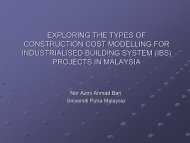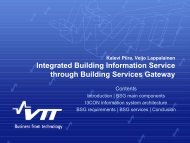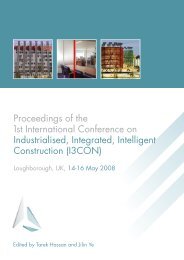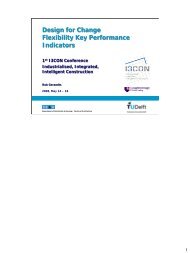Industrialised, Integrated, Intelligent sustainable Construction - I3con
Industrialised, Integrated, Intelligent sustainable Construction - I3con
Industrialised, Integrated, Intelligent sustainable Construction - I3con
Create successful ePaper yourself
Turn your PDF publications into a flip-book with our unique Google optimized e-Paper software.
HANDBOOK 2 SUSTAINABLE CONSTRUCTION<br />
“Facility managers are people who are actively involved in managing the delivery, operation,<br />
maintenance and disposal of their organisations facility or facilities. Many FMs have migrated from<br />
building-related professions such as architecture and engineering” (Moller and McCartney 2007).<br />
FM is based on the premise that the effectiveness and efficiency of an organisation is linked to the<br />
physical environment in which it operates (Barrett and Baldry 2003). Most FM operations occur at the<br />
operational phase of a building lifecycle to ensure the organisations’ buildings and infrastructure<br />
support business goals. Businesses that can run its facilities more efficiently will have a competitive<br />
advantage as well as the possibility of improving its profitability (Leifer 2003). Users and occupants<br />
of a building are concerned with getting their work completed with the minimum of disruption. FM<br />
provides a service to enable users to get their jobs done and must interact with the client for<br />
continuous improvement (Blyth and Worthington 2001). Duffy (2000) claimed the discipline has<br />
developed, although cost cutting seems to have become the predominant objective and distinguishing<br />
feature of FM in practice.<br />
“The expertise of the FM profession can contribute to almost every stage of the procurement process<br />
and hence the final product in an economic, social and environmental sense” (Hadi et al. 2006). By<br />
moving away from the operational phases of a facility and understanding that little is known regarding<br />
a buildings eventual use pattern at the design stages, FM can inform the process of briefing and<br />
building design (Clements-Croome 2004). This investment at the design phase can deliver significant<br />
benefits in use including minimised capital cost, maximised attributes that contribute to better<br />
business operation and minimised financial drain over the life cycle of the building (Halliday 2008).<br />
The building can be specified to meet the end-users’ core business activities.<br />
Facilities Management and Building Design<br />
Shah (2007) illustrates when the operational performance of a building is not met, whether this is due<br />
to the designers not fully understanding their remit or the operators not having the ability to manage<br />
the facility, it is the occupants and finances that suffer. Shah (2007) gives the possible reasons for<br />
poor design as follows:<br />
• Inadequate communication through the delivery of a facility where the client requirements are<br />
not included within the final designs or the FM is involved at a late stage.<br />
• Different agendas of the parties where the client brief does not always capture end-user<br />
requirements or the architects design without end-user input.<br />
• Decisions made without the view of long-term maintenance.<br />
• Minimal design timescale results in rushed decisions and fast handover<br />
FMs arguably have the greatest knowledge of facilities in operation and can inform the design of a<br />
new building of the end-user requirements. However, there is a tendency for those concerned in<br />
running the building not to talk to those who design and provide them (Halliday 2008). The FM must<br />
aim to have direct involvement with the Client, Architect and Project Manager to provide operational<br />
knowledge at an early stage. Designers need to understand the way people operate in buildings, the<br />
way in which they are used and the ways in which their performance and productivity can be<br />
maximised to the benefit of the organisation and society at large. Facilities Managers have a great role<br />
in advancing sustainability agenda through the continuous practice of <strong>sustainable</strong> FM (Elmualim et al.<br />
2009; Atkin and Brookes 2005).<br />
Methodology<br />
Methodology is a set of working methods and can be defined as a body of practices, procedures and<br />
rules used by those who engage in an enquiry. Research has a number of characteristics where data is<br />
collected and interpreted systematically with a clear purpose to finding things out. Systematic<br />
research is based on logical relationships and not just beliefs with the requirement of a clear purpose<br />
(Saunders et al. 2003).<br />
219






